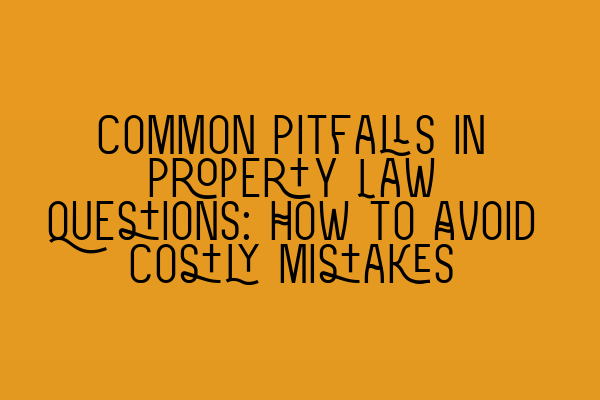Common Pitfalls in Property Law Questions: How to Avoid Costly Mistakes
When it comes to property law, there are various complexities and nuances that can trip up even the most seasoned professionals. Whether you are a solicitor, studying for the SQE Property Law exam, or simply navigating property transactions on your own, it is crucial to be aware of the common pitfalls that can lead to costly mistakes. In this blog post, we will discuss some of these pitfalls and provide guidance on how to avoid them.
1. Failing to Conduct Proper Due Diligence
One of the biggest mistakes in property law is not conducting thorough due diligence. This involves investigating the property’s legal title, surveying potential issues such as restrictions or encumbrances, and checking for any outstanding mortgages or charges. Failure to conduct proper due diligence can result in unexpected costs, disputes, or even legal issues down the line.
It is crucial to thoroughly review all relevant documents, such as title deeds, leases, and planning permissions. Consulting with experts, such as surveyors or land registry professionals, can provide valuable insights and help identify potential red flags that may not be apparent at first glance.
Misrepresentation in Contracts: Unveiling Deceptive Practices
2. Ignoring Local Planning Regulations
Each jurisdiction may have its own set of planning regulations and zoning restrictions. Failing to consider and adhere to these regulations can have serious consequences. From building extensions without proper permits to using a property for commercial purposes in a residential zone, ignoring local planning regulations can lead to fines, legal battles, and even forced demolitions.
Before undertaking any construction or alteration, it is essential to familiarize yourself with the local planning regulations. Consult with planning experts or local authorities to ensure compliance and obtain the necessary permits and permissions.
3. Overlooking Easements and Rights of Way
Easements and rights of way are legal rights that allow someone to use or access another person’s property. These rights can be implied or explicitly granted in legal documents such as deeds or leases. Failing to identify and understand easements and rights of way can lead to disputes and hinder the intended use or development of the property.
Reviewing title deeds and obtaining legal advice can help identify any easements or rights of way that may impact the property. It is crucial to understand the extent and limitations of these rights and consider their potential implications on future plans or transactions.
A Closer Look at SQE Contract Law Syllabus
4. Inadequate Lease Review
Leases can be complex legal documents that outline the rights and responsibilities of landlords and tenants. Failing to thoroughly review and understand the terms and conditions of a lease can result in disputes, unexpected costs, or even eviction proceedings.
When reviewing a lease, pay close attention to clauses related to rent, repairs and maintenance, service charges, and termination conditions. Ensure that the lease aligns with your client’s requirements and objectives and seek legal advice if any ambiguities or concerns arise.
SQE Contract Law: Analyzing Landmark Cases and Influential Judicial Decisions
5. Not Considering Tax Implications
Property transactions can have significant tax implications that should not be overlooked. Failing to consider the tax consequences of a property transaction can result in unexpected tax bills or missed opportunities for tax savings.
Seek advice from tax professionals or accountants to understand the tax implications of a property transaction. This can include stamp duty land tax, capital gains tax, or VAT considerations, depending on the nature of the transaction and the jurisdiction.
Conclusion
Property law can be intricate, and the potential pitfalls are numerous. However, by conducting thorough due diligence, adhering to local planning regulations, understanding easements and rights of way, reviewing leases carefully, and considering tax implications, you can significantly minimize the risk of costly mistakes.
Remember, when in doubt, always seek professional advice. Property transactions are substantial investments, and it is better to invest in proper legal guidance than to risk expensive consequences. By being diligent and proactive, you can navigate the complexities of property law with confidence and avoid the common pitfalls that can lead to costly mistakes.
Contract Law for Services: Key Considerations and Best Practices
